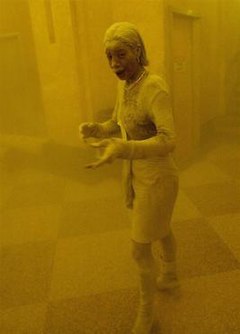Stan Honda: Difference between revisions
Pat Palmer (talk | contribs) |
Pat Palmer (talk | contribs) m (Text replacement - "World War 2" to "World War II") |
||
| (One intermediate revision by one other user not shown) | |||
| Line 27: | Line 27: | ||
In 2005 the journal ''[[Visual Resources]]'' published a special issue devoted to ''"Photojournalism, Mass Media and the Politics of Spectacle"''.<ref name=VisualResources2005/> | In 2005 the journal ''[[Visual Resources]]'' published a special issue devoted to ''"Photojournalism, Mass Media and the Politics of Spectacle"''.<ref name=VisualResources2005/> | ||
An interview with Honda formed an eight-page chapter of this issue of the journal. That interview focussed on Honda's photos of the after-effects on the World Trade Center attack, his photos of survivors the [[World War | An interview with Honda formed an eight-page chapter of this issue of the journal. That interview focussed on Honda's photos of the after-effects on the World Trade Center attack, his photos of survivors the [[World War II internment of those of Japanese descent]], and of his photos while embedded with American soldiers during the 21st century American invasion and [[History of Iraq (2003–11)|occupation of Iraq]]. | ||
Honda is known for capturing one of the most iconic images of the aftereffects of [[ | Honda is known for capturing one of the most iconic images of the aftereffects of [[Al-Qaeda]]'s attacks within the [[Continental USA]], the ''"[[dust lady]]"'', a survivor of the collapse of the [[World Trade Center (1973–2001)|World Trade Center]], so completely covered in white dust, that a viewer would have to look twice to recognize that Marcy Borders was African-American.<ref name=TorStar2015-08-26/> | ||
In March 2015 Honda wrote under his own byline, when he described his trip to the remote Arctic Island of [[Svalbard]] to record a rare [[total solar eclipse]].<ref name=Afp2015-03-25/> | In March 2015 Honda wrote under his own byline, when he described his trip to the remote Arctic Island of [[Svalbard]] to record a rare [[total solar eclipse]].<ref name=Afp2015-03-25/> | ||
Latest revision as of 09:49, 23 February 2024
| Stan Honda | |
|---|---|
| Occupation | photojournalist |
| Known for | creator of iconic and widely republished photos |
Stan Honda is a prolific and award-winning American photojournalist.[1]
Honda's first job as a professional photojournalist, following working as a volunteer photojournalist at the campus newspaper of the University of California at San Diego, was a 1981 gig at the Daily Californian.[2] Since then Honda has been employed by numerous publications, including: the San Diego Union Tribune, the Los Angeles Times, New York Newsday, The National Post, and Agence France-Presse.
Honda is also an amateur Astronomer, who has given lectures on photographing the night sky.[1]
In 2005 the journal Visual Resources published a special issue devoted to "Photojournalism, Mass Media and the Politics of Spectacle".[2] An interview with Honda formed an eight-page chapter of this issue of the journal. That interview focussed on Honda's photos of the after-effects on the World Trade Center attack, his photos of survivors the World War II internment of those of Japanese descent, and of his photos while embedded with American soldiers during the 21st century American invasion and occupation of Iraq.
Honda is known for capturing one of the most iconic images of the aftereffects of Al-Qaeda's attacks within the Continental USA, the "dust lady", a survivor of the collapse of the World Trade Center, so completely covered in white dust, that a viewer would have to look twice to recognize that Marcy Borders was African-American.[3]
In March 2015 Honda wrote under his own byline, when he described his trip to the remote Arctic Island of Svalbard to record a rare total solar eclipse.[4]
Honda produced a DVD narrative of a selection of some of iconic images, entitled "Eyewitness: Stan Honda - Reflections of a Photojournalist."[5]
References
- ↑ 1.0 1.1 Stan Honda captures the stars, Yahoo News, 2015. Retrieved on 2015-08-27.
- ↑ 2.0 2.1 Amy Lyford, Carol Payne. "Photojournalism, Mass Media and the Politics of Spectacle", Visual Resources: An International Journal of Documentation, 2005, pp. 147–154. Retrieved on 2015-08-27.
- ↑ J. Freedom du Lac. ’Dust Lady’ Marcy Borders, featured in haunting Sept. 11 photo, dies of cancer: Before she died, Marcy Borders wondered whether her cancer was related to Sept. 11., Toronto Star, 2015-08-26. Retrieved on 2015-08-26. “She was 28 at the time, and Honda’s haunting photo of her — distributed worldwide by Agence France-Presse — became one of the most iconic images of that horrifying day.”
- ↑ Stan Honda. Dusk in the Arctic, Agence France-Presse, 2015-03-25. Retrieved on 2015-08-27.
- ↑ Stan Honda. Eyewitness: Stan Honda - Reflections of a Photojournalist. Retrieved on 2015-08-27.
